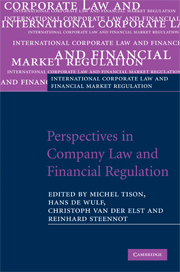Book contents
- Frontmatter
- Contents
- List of contributors
- Foreword
- PART I Perspectives in company law, SECTION 1: European company law: regulatory competition and free movement of companies
- PART 1 Perspectives in company law, SECTION 2: Corporate governance, shareholders' rights and auditing
- PART 1 Perspectives in company law, SECTION 3: Takeover law
- PART II Perspectives in financial regulation, SECTION 1: European perspectives
- PART 2 Perspectives in financial regulation, SECTION 2: Transatlantic perspectives
- 28 Learning from Eddy: a meditation upon organizational reform of financial supervision in Europe
- 29 The SEC embraces mutual recognition
- 30 Steps toward the Europeanization of US securities regulation, with thoughts on the evolution and design of a multinational securities regulator
- 31 The subprime crisis – does it ask for more regulation?
- 32 Juries and the political economy of legal origin
- PART III Miscellaneous
- Index
- References
32 - Juries and the political economy of legal origin
from PART 2 - Perspectives in financial regulation, SECTION 2: Transatlantic perspectives
Published online by Cambridge University Press: 04 August 2010
- Frontmatter
- Contents
- List of contributors
- Foreword
- PART I Perspectives in company law, SECTION 1: European company law: regulatory competition and free movement of companies
- PART 1 Perspectives in company law, SECTION 2: Corporate governance, shareholders' rights and auditing
- PART 1 Perspectives in company law, SECTION 3: Takeover law
- PART II Perspectives in financial regulation, SECTION 1: European perspectives
- PART 2 Perspectives in financial regulation, SECTION 2: Transatlantic perspectives
- 28 Learning from Eddy: a meditation upon organizational reform of financial supervision in Europe
- 29 The SEC embraces mutual recognition
- 30 Steps toward the Europeanization of US securities regulation, with thoughts on the evolution and design of a multinational securities regulator
- 31 The subprime crisis – does it ask for more regulation?
- 32 Juries and the political economy of legal origin
- PART III Miscellaneous
- Index
- References
Summary
Introduction
Legal origin – common law versus civil law – is important to the past decade's finance theory. Peculiarly, the theory has not had traction in the academic legal literature, which might be surprising given academic disciplines' understandable tendency to see their own issues as central and determinative. What legal academic commentary that the theory has provoked has either been sceptical that the legal origins channels that the law and finance literature promotes are really so important or sceptical that origin could be as important as modern political economy considerations. That is, while the legal literature hardly denigrates law's importance, it has doubted the importance of legal origin to financial development. Mahoney, although sympathetic in part (particularly to the idea of a detrimental statist nature of civil law), denigrates the idea that civil law codification can be as important as the legal origin theory had hypothesized, since so much of American corporate and commercial law is codified. Coffee sees the propensity of some countries to disrupt their stock markets, which would have provided the needed investor protections regardless of underlying legal institutions, as central. Roe indicates that while property rights and investor protection are important, legal origin differences cannot explain the institutional differences, since common law countries use non-common-law institutions, such as securities regulators, and not just common-law-oriented fiduciary duties: modern political economy forces are likely to explain modern financial and investor protection differences in wealthy nations better than legal origin.
- Type
- Chapter
- Information
- Perspectives in Company Law and Financial Regulation , pp. 583 - 604Publisher: Cambridge University PressPrint publication year: 2009

